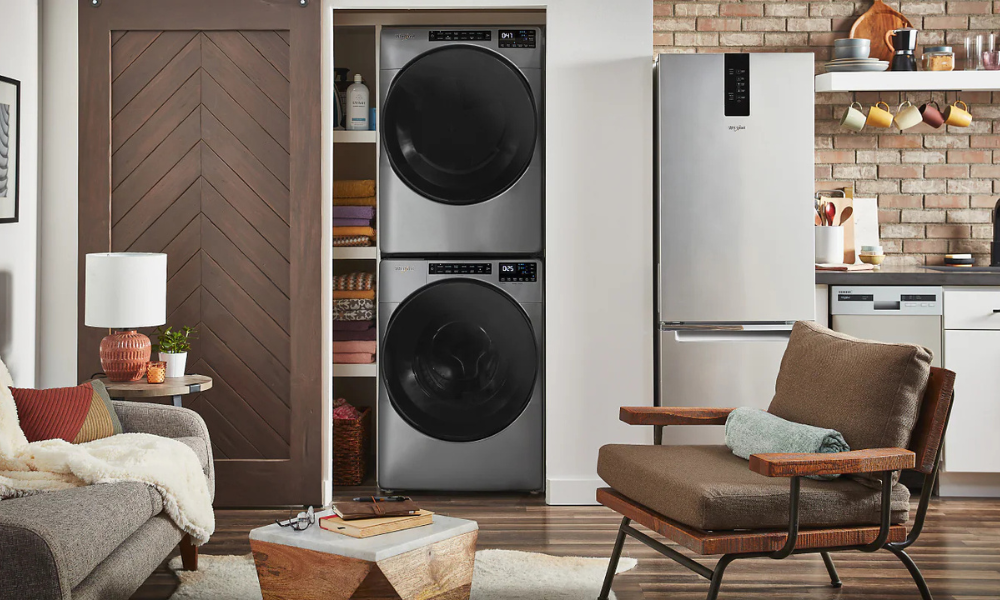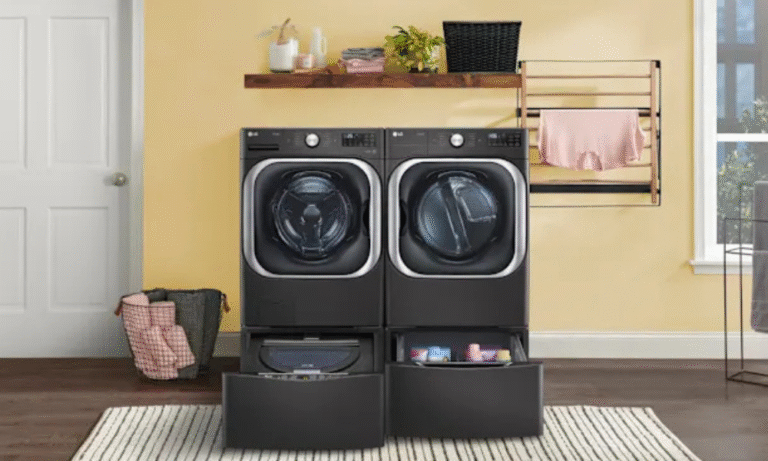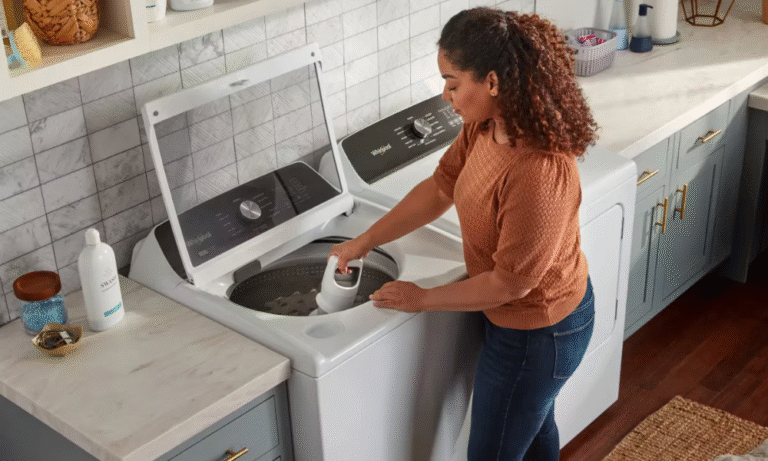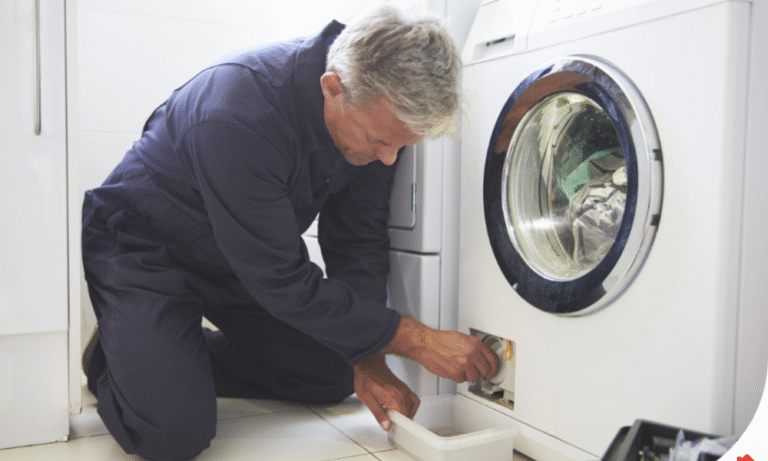Estimated reading time: 17 minutes
Last updated on August 21st, 2025 at 05:47 am
We will go into the world of washing machine noise reduction in this extensive tutorial. We are all aware of the potential disruption that a noisy washing machine can cause, particularly when attempting to maintain a calm household atmosphere. Understanding the causes of washing machine noise and learning practical techniques to reduce it may significantly improve your laundry experience. Let’s delve deeper into the subject and learn how to do laundry that is less noisy.
What Is Washing Machine Noise
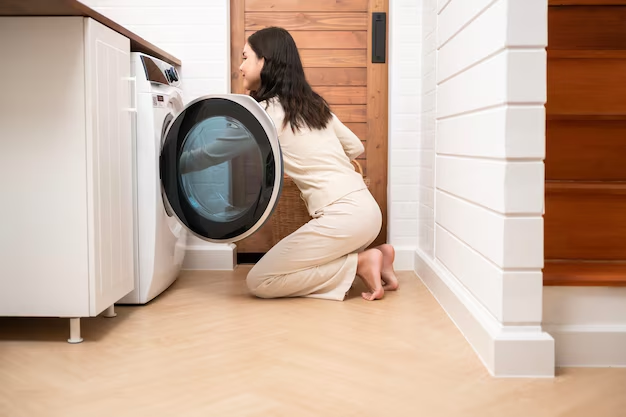
Photo Credit: freepik
Detailed Explanation Of Washing Machine Noise Production
Washing machines make noise as a result of a number of operational elements and causes. The following are some important factors that affect the loudness that washing machines make:
Motor
The motor of the washing machine powers the agitator and drum. The motor may make some noise when it turns, particularly if the motor is unbalanced or the bearings are worn out.
Drum and Agitator
The drum and agitator are essential parts of the washing machine that facilitate the cleaning process. The agitator or the internal surface of the drum might make noise when the clothing within the drum move throughout the wash or spin cycles.
Bearings
The rotating drum is supported by washers’ bearings. These bearings may eventually become worn out, which would increase operating noise. An issue with the bearings may be indicated by a loud grinding or rumbling sound.
Pump
A washing machine’s pump aids in the water’s drainage during the spin cycle. The pump may make strange noises like buzzing or rattling if it becomes blocked or is malfunctioning.
Water Inlet Valve
The water inlet valve is where water enters the washing machine. A valve that is broken or not working correctly may make a humming or buzzing sound.
Modern washing machines typically contain a suspension mechanism that reduces vibrations during the spin cycle. Excessive vibrations and noise may result from a worn-out or defective suspension system.
Unbalanced loads
Overloading the washing machine with too many clothes or loading it unevenly might make the machine unbalanced. The imbalance might cause the drum to make more noise throughout the spin cycle as it attempts to balance out the unbalanced weight distribution.
Tips for Preventing Washing Machine Noise
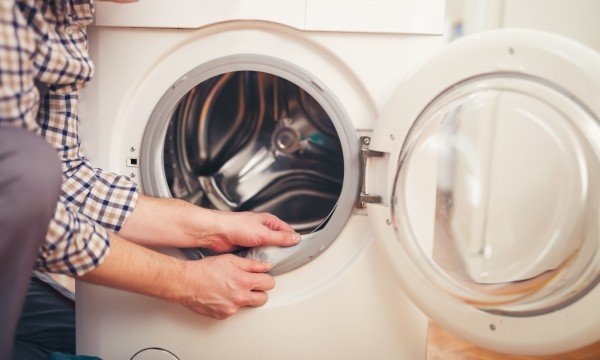
Photo Credit: yellowpages
Simple Steps to Minimize Washing Machine Noise
The following advice can help you reduce washing machine noise:
Level the Machine
Ensure that your washing machine is placed on a level surface. To determine whether it is balanced, use a spirit level. Unless it is level, adjust the leveling feet. This reduces noise and vibration during operation.
Avoid Overloading
Don’t put too many clothes in the washing machine. Unbalanced loads brought on by overloading might cause the machine to shake excessively and make noise. For the highest load capacity, adhere to the manufacturer’s instructions.
Distribute the Load Evenly
When loading the machine, distribute the clothes evenly around the drum. Laundry that is spread unevenly might cause an imbalance during the spin cycle and increase noise. Make careful to evenly distribute the clothing.
Inspect and Maintain
Regularly inspect and maintain your washing machine. Clean the filters as directed by the manufacturer, clean the drum and agitator, and take out any trash or foreign items. Noise is decreased and smooth functioning is ensured by proper maintenance.
Check for Loose Parts
On a regular basis, look for any loose panels, screws, or bolts. To stop them from rattling or banging while operating, tighten them if necessary.
Use Anti-Vibration Pads
Place anti-vibration pads or mats beneath the washing machine. These pads minimize the effect of vibrations on the surrounding environment by absorbing vibrations and decreasing noise transmission to the floor.
Check for Damaged or Worn Parts
Look for any worn-out or damaged parts on the washing machine. Poorly maintained bearings, belts, or suspension systems can make a lot of noise. As required, swap out or fix these components.
Choose a Quiet Cycle
Some washing machines offer specific cycles or settings designed for quieter operation. These cycles often feature smoother movements and slower spin rates, which lowers noise levels. When noise reduction is a top concern, choose these alternatives.
Maintain a Clear Space
Ensure that there is enough space around the washing machine. Avoid placing anything near or on top of the machine that might produce vibrations or affect how it works.
Consult a Professional
If your washing machine is making a lot of noise or any noise at all, you should seek the advice of a professional technician. Any underlying problems that may be creating the noise can be identified and fixed by them.
You may reduce washing machine noise and have a quieter laundry experience by paying attention to these suggestions.
Soundproofing Your Laundry Area
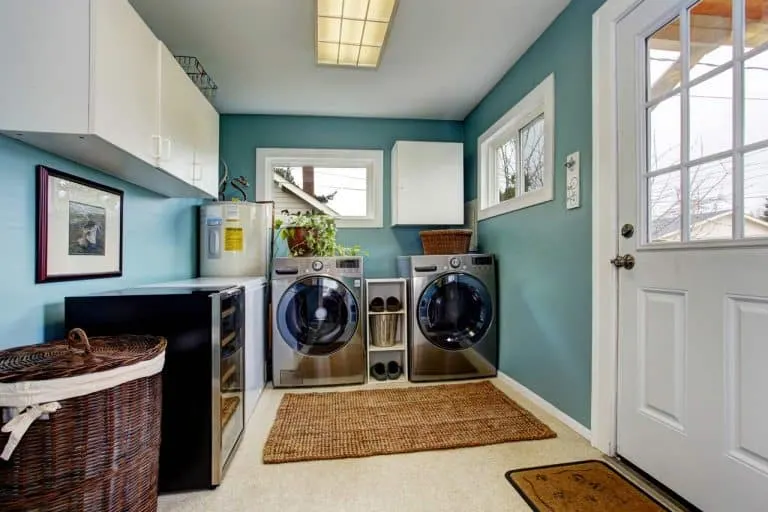
Photo Credit: soundproofcentral
Soundproofing Techniques for a Quieter Laundry Room
Here are some soundproofing methods you may use to reduce washing machine noise and make your laundry room more peaceful:
Insulate Walls
Cover the walls of your laundry room with insulation materials like acoustic foam panels or soundproofing blankets. These materials significantly minimize noise by aiding in the absorption and transmission of sound waves.
Seal Cracks and Gaps
Inspect your laundry room for any gaps or cracks around windows, vents, and doors. To stop sound from exiting or entering the room, caulk or weatherstripping should be used to plug these gaps.
Upgrade Doors
Consider replacing your standard door with a solid-core door or a soundproof door. These doors reduce noise transmission because they are denser and offer superior sound insulation than standard doors.
Install Soundproof Curtains
Cover windows or entrances with thick soundproof curtains. These thick, multi-layered curtains may block and absorb sound, resulting in a calmer environment.
Use Carpet or Rugs
Cover the floor of your laundry room with thick carpet or rugs. The soft fabrics lessen the noise made by the washing machine by absorbing vibrations.
Soundproof Ceiling
If at all feasible, add more insulation or acoustic panels to the ceiling of your laundry room. This lessens noise transmission to other areas of the home and prevents sound from reflecting off the ceiling.
Consider Soundproofing Pads or Platforms
Use soundproofing pads or platforms beneath your washing machine and dryer. These specific items assist in absorbing vibrations and preventing their transmission to the floor and vicinity.
Create a Buffer Space
If your laundry room is next to a living space or a bedroom, think about creating a buffer space between them with a closet or storage space. By serving as extra sound barriers, these buffer gaps reduce noise transmission.
Move Appliances
If at all feasible, move your washer and dryer out of the living room and away from the bedroom. The noise in the laundry room can be reduced by putting them in a different room or a location with greater soundproofing.
Regular Maintenance
Ensure that your washing machine is well-maintained and in good working condition. To reduce needless noise, regularly clean the filters, check for loose components, and take care of any mechanical concerns right away.
You can drastically lower washing machine noise and create a calmer, more relaxing laundry room atmosphere by using these soundproofing measures.
Choosing a Quieter Washing Machine: What to Consider
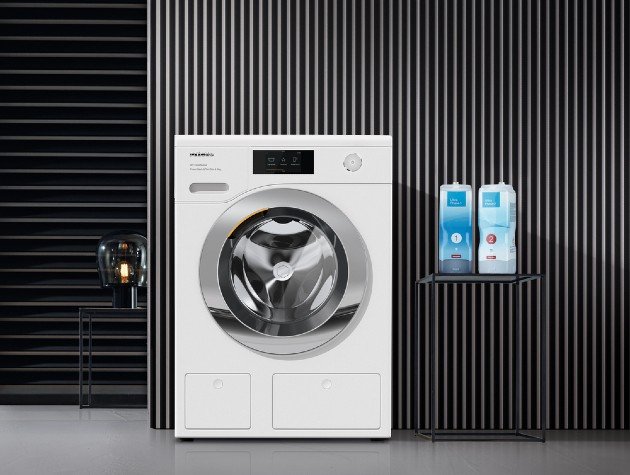
Photo Credit: quietmark
There are a number of things to think about that might help you decide if you want to change to a quieter washing machine. When choosing a quieter washing machine, bear the following considerations in mind:
Noise Ratings
Look for washing machines that display noise ratings or decibel (dB) levels. The machine is quieter the lower the dB level. Look for equipment that especially promotes silent or quiet operation.
Vibration Control
Consider washing machines with advanced vibration control features. These can be anti-vibration technologies or suspension systems that assist decrease vibrations during operation, reducing noise.
Insulation
Check if the washing machine has built-in insulation to dampen noise. To lessen noise transmission, certain models could include extra layers or sound-absorbing components.
Spin Speed Options
Choose a washing machine that offers adjustable spin speeds. Having the option to adjust spin speed can assist minimize spin cycle noise levels since higher spin speeds frequently produce more noise.
Design and Construction
Look for washing machines that are built with quality materials. Strongly constructed machines often operate with less noise and vibration.
Inverter Motor
Consider washing machines equipped with inverter motors. Due to their varied speeds and reduced noise, inverter motors are often quieter and more energy efficient than standard motors.
Reviews and User Feedback
Read reviews and user feedback about the washing machine models you are considering. Take note of remarks on noise levels and general satisfaction with noise reduction.
Quiet or Eco Cycles
Some washing machines offer specific cycles designed for quieter operation, such as “Quiet” or “Eco” modes. To minimize noise, these cycles often operate at lower spin speeds or employ different agitation methods.
Brand Reputation
Take into account respected brands that are known for their emphasis on product quality and noise reduction. Find brands that prioritize quieter operations in their washing machine models by comparing and researching various manufacturers.
Warranty and Support
Verify the manufacturer’s warranty and customer support policies. In the event that the washing machine has any noise-related problems, a trustworthy guarantee, and attentive customer service can offer peace of mind.
You may pick a washing machine that is particularly made to run silently by taking into account these characteristics, guaranteeing a more tranquil laundry experience at home.
Maintenance and Troubleshooting Tips
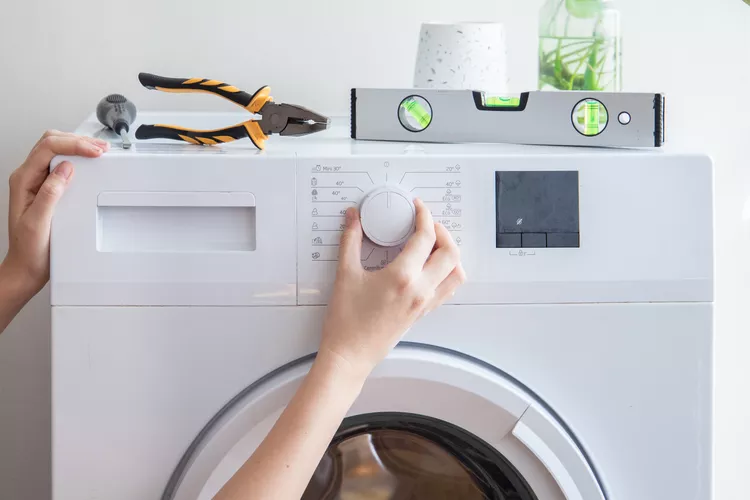
Photo Credit: thespruce
Regular Maintenance and Troubleshooting for Noise Reduction
Use the following maintenance advice to keep your washing machine quieter and solve noise-related problems:
Clean the Drum and Agitator
The drum and agitator should be regularly cleaned to get rid of any accumulated dirt, lint, or foreign objects. When the wash or spin cycles are running, these impediments may make noise.
Check and Clean Filters
To avoid obstructions, check and clean the filters often. Filters that are blocked can reduce water flow, make washing machines work harder, and even make more noise.
Inspect Hoses and Connections
Periodically inspect the hoses and connections of your washing machine for any leaks or loose fittings. Vibrations and noise during operation may be brought on by damaged or loose connections.
Level the Machine
Make sure your washing machine is placed on a level platform and is correctly leveled. To check for any imbalances and to adjust the leveling feet as necessary, use a spirit level. By doing this, noise and vibration are reduced.
Balance the Load
Properly distribute the clothes inside the drum to create a balanced load. During the spin cycle, an imbalanced load may cause excessive vibrations and noise. Do not overwork the equipment.
Tighten Any Loose Parts
Frequently check for any loose panels, screws, or bolts. If required, tighten them since rattling or banging sounds during operation might be caused by loose parts.
Address weird Noises Right Away
If you hear weird or persistent noises coming from your washing machine, look into them right away. If necessary, consult the owner’s handbook or get help from a specialist.
Lubricate Moving Parts
As needed, lubricate any moving parts according to the manufacturer’s instructions. The friction and noise produced by mechanical components can be reduced with proper lubrication.
Check the Suspension System
If your washing machine has a suspension system, inspect it for any signs of damage or wear. Vibrations and noise during the spin cycle may be worsened by a worn-out suspension system.
Follow the Manufacturer’s Instructions
Always follow the manufacturer’s instructions for maintenance and troubleshooting. These instructions, which are particular to your washing machine model, can support maintaining peak performance and minimizing noise.
Your washing machine will run more quietly and last longer if you give it routine maintenance and take care of any noise-related problems right away.
Expert Advice for Noise Reduction
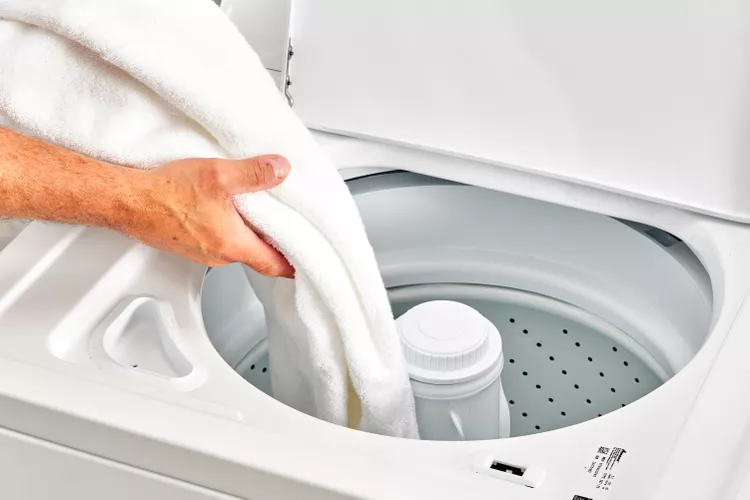
Photo Credit: thespruce
Here are some tips from appliance repair experts to learn more about how to reduce washing machine noise:
Choose Quality Brands
According to professionals, opting for reputable brands known for their quality and attention to noise reduction can make a significant difference. To reduce noise levels while operating, these businesses frequently make investments in cutting-edge engineering and technology.
Maintain good Balance
Maintaining a good balance is essential for noise reduction in your washing machine. To avoid excessive vibrations and noise, appliance repair experts stress the need of leveling the machine and spreading the weight equally.
Inspect and Replace Worn Parts
Over time, components such as bearings, belts, or suspension systems may wear out and contribute to increased noise levels. To keep a quieter washing machine, experts advise routine inspection and replacement of old or broken parts.
Seek Professional Help
If you are experiencing persistent or unusual noises from your washing machine, it is advisable to consult a professional appliance repair technician. They are qualified to identify the noise’s primary origin and offer suitable remedies.
Regular Maintenance
To avoid problems with noise, appliance repair experts emphasize the need of routine maintenance. Filters should be cleaned, dirt should be removed, and moving components should be lubricated in accordance with manufacturer recommendations.
Avoid Overloading
Overloading the washing machine can lead to imbalanced loads, resulting in increased vibrations and noise. For a quieter operation, experts advise sticking to the recommended load capacity.
Address Noises Promptly
Timely attention to any unusual noises is crucial. Ignoring or postponing taking care of the problem may result in further damage and perhaps greater repair expenses. It is advisable to take care of any issues with noise as soon as they appear.
Stay Informed
Industry experts suggest adhering to the directions and recommendations provided by the manufacturer. By doing this, you can be sure that you are aware of any particular maintenance guidelines and can adhere to them in order to preserve peak performance and reduce noise.
Options for soundproofing
In some circumstances, experts advise looking into soundproofing methods for the laundry room to further limit noise transmission. These methods could involve employing sound-absorbing materials, insulation, and gap sealing.
Upgrade
If your older washing machine routinely makes too much noise, experts advise thinking about upgrading to a more recent model with enhanced noise reduction capabilities. Modern designs and technology frequently operate more quietly.
Following this advice from experts can help you address and reduce washing machine noise, resulting in a quieter and more pleasurable laundry experience.
Additional Ways to Reduce Laundry Noise
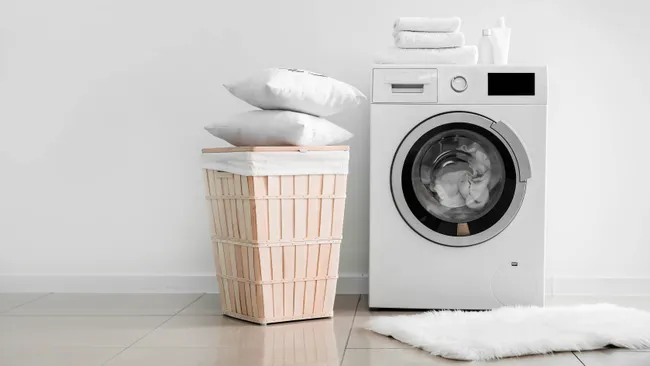
Photo Credit: espares.co
Here are some creative ideas to further minimize laundry noise in addition to the previously mentioned advice:
Soundproof Box or Enclosure
Consider constructing a soundproof box or enclosure around your washing machine. Materials like thick foam or soundproof panels can be used to build this. As a wall, the box traps the noise and keeps it from permeating the entire space.
Anti-Vibration Washing Machine Feet
Upgrade the feet of your washing machine with specialized anti-vibration pads or feet. These cutting-edge accessories limit noise transfer to the floor and adjacent regions by absorbing vibrations.
Floating Floor
Install a floating floor beneath your washing machine. Sound-absorbing components make up a floating floor, which helps to dampen sounds and absorb vibrations. Between the machine and the floor, it serves as an extra layer of insulation.
Water Hammer Arrestor
Install a water hammer arrestor on the water supply lines of your washing machine. When the water flow abruptly ceases, it can cause loud slamming noises known as water hammer. As a result of the arrestor’s shock absorption, noise is avoided.
Acoustic Panels or Tiles
Cover the walls and ceiling of your laundry room with acoustic panels or tiles. The purpose of these specialty panels is to absorb sound waves, which lessens echo and noise reflection in the space.
Soundproof Curtains or Blinds
In addition to their aesthetic appeal, heavy soundproof curtains or blinds can help reduce noise by blocking sound waves from entering or leaving the room. To reduce noise transmission, install the theme on windows or doorways.
Remote Laundry Room
If at all feasible, move your laundry area to a different room or an area of your house that is more remote. This helps keep the noise in that room and lessens the effect it has on other parts of the house.
Noise-Canceling Devices
Explore the use of noise-canceling devices or technologies specifically designed for reducing appliance noise. A calmer atmosphere is produced by these devices’ sound waves, which cancel out or neutralize washing machine noise.
Smart Home Integration
Consider a washing machine with smart home integration features. Some versions let you plan washing cycles for times when your hearing is less sensitive, such as when you’re not home or during calmer hours.
Do-it-yourself soundproofing
Look into DIY soundproofing methods for your laundry room. To lessen noise transmission, materials like mass-loaded vinyl, foam insulation, or weatherstripping may be used.
Remember that depending on the precise noise sources and the design of your laundry room, the efficacy of these creative solutions may vary. It’s essential to evaluate your circumstance and select the answers that best meet your requirements.
Conclusion
In order to create a peaceful and cozy home atmosphere, noise reduction in washing machines is an essential component. You may drastically reduce the noise your washing machine makes by using the tips and tricks covered in this article, allowing you to do your laundry in peace.
We started by gaining a grasp of the sources of noise in washing machines, emphasizing things like vibrations, imbalanced loads, and mechanical parts. Following that, we offered straightforward instructions for reducing washing machine noise, such as appropriate leveling, load balancing, routine maintenance, and the use of sound-absorbing materials.
Frequently Asked Questions
1. Why is my washing machine making loud banging noises?
A number of things can cause a washing machine to make loud pounding noises. An imbalanced load inside the drum, where heavier objects like trousers or towels collect on one side, might be the root of the problem. The hammering sounds might also be caused by sloppy or worn-out suspension springs, drum paddles, or shock absorbers. If the noise continues, it’s crucial to redistribute the weight evenly and examine and fix any broken parts.
2. Are all front-loading washing machines quieter than top-loading ones?**
A: Compared to top-loading washers, front-loaders are often quieter. As opposed to top-loading machines, which use an agitator mechanism, front-loading machines use a tumble motion and horizontal drum orientation, which produces less noise. The particular model, brand, and other noise-reducing measures included into the machine might still affect the noise levels.
3. Can I use regular foam padding for vibration reduction?**
A: While standard foam padding can help reduce vibration to some extent, it might not be as effective as anti-vibration cushions made especially for washing machines. These pads are made from components that have excellent stress absorption and noise dampening qualities. Use of anti-vibration pads created especially for washing machines is advised for maximum vibration reduction.
4. Is it normal for a washing machine to make some noise during operation?**
A: A washing machine making some noise while it is running is typical. Washing machines inherently make noise because they have many moving elements, including motors, pumps, and rotating drums. However, loud, persistent, or out-of-the-ordinary noises that are excessive or uncommon may point to a problem that has to be fixed, such as loose parts, worn-out bearings, or broken components.
5. Are there any specific brands known for producing quieter washing machines?
A: Despite the fact that many companies provide washing machines with noise reduction capabilities, it is challenging to name certain brands that are recognized for making quieter washing machines because noise levels can vary within each brand’s product range. However, it is recommended to take into account recognized manufacturers whose product designs place a high priority on noise reduction. You may find models that will likely produce quieter laundry by reading user reviews, comparing noise level ratings, and browsing for washing machines with cutting-edge noise-reducing features.
